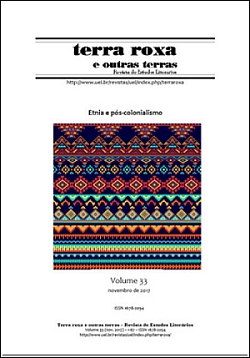Literatura infanto-juvenil africana no Brasil: um levantamento bibliográfico
DOI:
https://doi.org/10.5433/1678-2054.2017v33p52Palabras clave:
Literatura Infanto-juvenil, Literaturas africanas de língua portuguesa, LeituraResumen
O objetivo do presente trabalho é analisar algumas obras de autores dos Países Africanos de Língua Oficial Portuguesa (PALOP) destinadas ao público infanto-juvenil publicadas em nosso país. Nos PALOP há, atualmente, dois sistemas literários bem estabelecidos: Angola e Moçambique. O primeiro conta com uma preocupação com a cultura e a literatura muito forte após a independência, em 1975. A União dos Escritores Angolanos (UEA) e o Instituto Nacional do Livro e do Disco (INALD) incentivaram e promoveram a publicação de obras destinadas à formação de um público leitor infantojuvenil. Em Moçambique, o mesmo papel coube à Associação dos Escritores Moçabicanos (AEMO). Notamos que nomes já consagrados no gênero nos PALOP como Gabriela Antunes, Dario de Melo e Cremilda Lima não foram publicados aqui. Contudo, nomes conhecidos como Mia Couto, Ondjaki, José Luandino Vieira, José Eduardo Agualusa e Ungulani Ba Ka Khosa, por exemplo, são autores que têm obras disponíveis em nosso país. Assim, os jovens leitores brasileiros têm acesso à obras de qualidade em que cultura africana aparece na visão de escritores dos PALOP. Pretendemos, portanto, refletir sobre algumas dessas produções, a fim de as contextualizar e, principalmente, atestar a relevância dessas obras, pouco conhecidas em nosso país.Descargas
Citas
ANDRUETTO, María Teresa. Por uma literatura sem adjetivos. São Paulo: Pulo do gato, 2012.
BAJOUR, Cecília. Ouvir nas entrelinhas: o valor da escuta nas práticas de leitura. São Paulo: Pulo do gato, 2012.
CASCUDO, Luis da Câmara. Contos Tradicionais do Brasil (Folclore). Rio de Janeiro: Ediouro, 1989.
CHAMBERS, Iain. “Poder, língua e a poética do pós-colonialismo”. Via Atlântica (São Paulo), n. 17, p. 19-28, jun. 2010. Disponível em: http://www.revistas.usp.br/viaatlantica/article/view/50529. Acesso em 15 de ago de 2017.
CHEVALIER, Jean & Alain Gheerbrant(orgs). Dicionário de símbolos. Rio de Janeiro: José Olympio, 2000.
CIRLOT, Juan Eduardo. Dicionário de símbolos. São Paulo: Moraes, 1984.
HALL, Stuart. A identidade cultural na pós-modernidade. Rio de Janeiro: Lamparina, 2015.
HAMILTON, Russel. “A literatura dos PALOP e a Teoria Pós-Colonial”. Via Atlântica (São Paulo), n. 3, p. 12-23, dez. 1999. Disponível em: http://www.revistas.usp.br/viaatlantica/article/view/48809/52884. Acesso em 15 de ago de 2017.
HUSTON, Nancy. A espécie fabuladora. Porto Alegre: L&PM, 2010.
JOUVE, Vincent. Por que estudar literatura? São Paulo: Parábola, 2012.
KHOSA, Ungulani Ba Ka. O rei mocho. São Paulo: Kapulana, 2016.
MACÊDO, Tania & Rita Chaves. Literaturas de Língua Portuguesa: Marcos e Marcas – Angola. São Paulo: Arte & Ciência, 2007.
OLIVEIRA, Maria Anória de Jesus. Áfricas e diásporas na literatura infanto-juvenil no Brasil e em Moçambique. Salvador: EDUNEB, 2014.
ONDJAKI. O leão e o colelho saltitão. Rio de Janeiro: Língua Geral, 2009.
REYES, Yolanda. Ler e brincar, tecer e cantar. Literatura, escrita e educação. São Paulo: Pulo do gato, 2012.
ROSÁRIO, Lourenço Joaquim da Costa. A narrativa africana de expressão oral: transcrita em português. Lisboa: ICALP, 1989.
SAID, Edward. Cultura e imperialismo. São Paulo: Companhia das Letras, 2011.
SECCO, Carmen Lucia Tindó (org). Entre fábulas e alegorias: ensaios sobre literatura infantil de Angola e Moçambique. Rio de Janeiro: Quartet, 2007.
SILVA, Vitor Manuel de Aguiar e. As humanidades, os estudos culturais, o ensino da literatura e a política da língua portuguesa. Coimbra: Almedina, 2010.
Descargas
Publicado
Cómo citar
Número
Sección
Licencia
Los autores que publican en esta revista aceptan los siguientes términos:
a) Los autores conservan los derechos de autor y otorgan a la revista el derecho de primera publicación, siendo la obra licenciada simultáneamente bajo la Licencia Creative Commons Reconocimiento-No Comercial 4.0 Internacional, permitiendo la compartición de la obra con reconocimiento de la autoría de la obra y publicación inicial en este periódico académico.
b) Los autores están autorizados a asumir contratos adicionales por separado, para distribución no exclusiva de la versión del trabajo publicado en esta revista (por ejemplo, publicar en un repositorio institucional o como capítulo de libro), con reconocimiento de autoría y publicación inicial en esta revista. diario.
c) Se permite y anima a los autores a publicar y distribuir su trabajo en línea (por ejemplo, en repositorios institucionales o en su página personal) después del proceso editorial, ya que esto puede generar cambios productivos, así como aumentar el impacto y la citación del trabajo publicado (Ver Efecto del Acceso Abierto).
d) Los autores de los trabajos aprobados autorizan a la revista para que, luego de la publicación, transfiera su contenido para su reproducción en indexadores de contenido, bibliotecas virtuales y similares.
e) Los autores asumen que los textos sometidos a publicación son de su creación original, asumiendo total responsabilidad por su contenido en caso de objeción por parte de terceros.





















